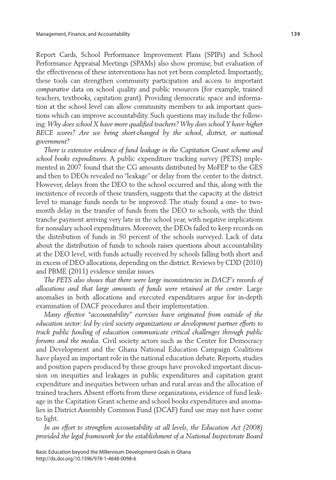Management, Finance, and Accountability
Report Cards, School Performance Improvement Plans (SPIPs) and School Performance Appraisal Meetings (SPAMs) also show promise, but evaluation of the effectiveness of these interventions has not yet been completed. Importantly, these tools can strengthen community participation and access to important comparative data on school quality and public resources (for example, trained teachers, textbooks, capitation grant). Providing democratic space and information at the school level can allow community members to ask important questions which can improve accountability. Such questions may include the following: Why does school X have more qualified teachers? Why does school Y have higher BECE scores? Are we being short-changed by the school, district, or national government? There is extensive evidence of fund leakage in the Capitation Grant scheme and school books expenditures. A public expenditure tracking survey (PETS) implemented in 2007 found that the CG amounts distributed by MoFEP to the GES and then to DEOs revealed no “leakage” or delay from the center to the district. However, delays from the DEO to the school occurred and this, along with the inexistence of records of these transfers, suggests that the capacity at the district level to manage funds needs to be improved. The study found a one- to twomonth delay in the transfer of funds from the DEO to schools, with the third tranche payment arriving very late in the school year, with negative implications for nonsalary school expenditures. Moreover, the DEOs failed to keep records on the distribution of funds in 50 percent of the schools surveyed. Lack of data about the distribution of funds to schools raises questions about accountability at the DEO level, with funds actually received by schools falling both short and in excess of DEO allocations, depending on the district. Reviews by CDD (2010) and PBME (2011) evidence similar issues. The PETS also shows that there were large inconsistencies in DACF’s records of allocations and that large amounts of funds were retained at the center. Large anomalies in both allocations and executed expenditures argue for in-depth examination of DACF procedures and their implementation. Many effective “accountability” exercises have originated from outside of the education sector: led by civil society organizations or development partner efforts to track public funding of education communicate critical challenges through public forums and the media. Civil society actors such as the Center for Democracy and Development and the Ghana National Education Campaign Coalitions have played an important role in the national education debate. Reports, studies and position papers produced by these groups have provoked important discussion on inequities and leakages in public expenditures and capitation grant expenditure and inequities between urban and rural areas and the allocation of trained teachers. Absent efforts from these organizations, evidence of fund leakage in the Capitation Grant scheme and school books expenditures and anomalies in District Assembly Common Fund (DCAF) fund use may not have come to light. In an effort to strengthen accountability at all levels, the Education Act (2008) provided the legal framework for the establishment of a National Inspectorate Board Basic Education beyond the Millennium Development Goals in Ghana http://dx.doi.org/10.1596/978-1-4648-0098-6
139
